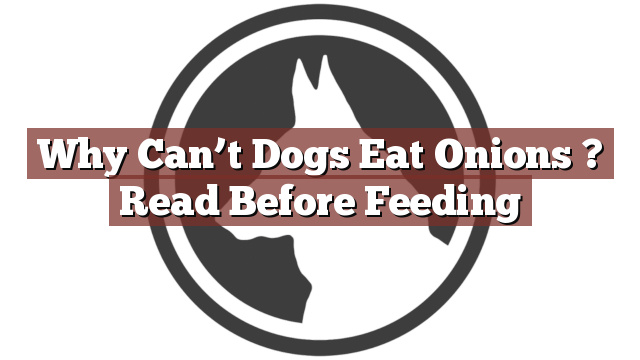Understanding Your Dog’s Dietary Needs
As a responsible pet owner, it is essential to understand your dog’s dietary needs in order to provide them with a healthy and balanced diet. While dogs are primarily carnivores, they can also benefit from certain fruits and vegetables in moderation. However, it is crucial to be aware of foods that can be harmful or even toxic to our furry friends. One such food item that should be strictly avoided is onions.
Why Can’t Dogs Eat Onions? Read Before Feeding
Can dogs eat onions? The answer is a resounding no. Onions, along with other members of the Allium family, such as garlic, shallots, and leeks, contain compounds that can be toxic to dogs. These compounds, known as thiosulfates, can cause a condition called hemolytic anemia in canines. This condition involves the breakdown of red blood cells, leading to a decrease in oxygen-carrying capacity and potential damage to vital organs.
Onions can be toxic to dogs in any form – whether raw, cooked, dehydrated, or powdered. Even small amounts of onion can pose a significant risk to your furry friend’s health. Symptoms of onion toxicity in dogs may include weakness, lethargy, pale gums, vomiting, diarrhea, rapid breathing, and even collapse. If you suspect your dog has ingested onions or shows any of these symptoms, it is crucial to seek veterinary assistance immediately.
Pros and Cons of Feeding Onions to Dogs
As mentioned earlier, there are no pros to feeding onions to dogs. The cons, however, are significant and potentially life-threatening. Onions can cause oxidative damage to a dog’s red blood cells, leading to anemia. This can be particularly dangerous for certain breeds, such as Japanese breeds like Akitas and Shiba Inus, as they are more susceptible to this condition.
While some pet owners may argue that small amounts of onions are unlikely to harm their dogs, it is always better to err on the side of caution when it comes to our furry friends’ health. It is important to note that even a small amount of onion can accumulate in a dog’s system over time, causing long-term damage.
Conclusion: Keep Your Dog Safe and Healthy by Avoiding Onions
In conclusion, it is vital to understand that onions are toxic to dogs and should never be included in their diet. Being aware of the potential dangers of feeding onions to dogs and recognizing the symptoms of onion toxicity can help you protect your beloved pet from unnecessary harm. If you ever have any doubts about whether a particular food is safe for your dog to consume, consult with your veterinarian who can provide you with expert advice tailored to your furry friend’s specific needs. Remember, a healthy diet is essential for your dog’s overall well-being, so always prioritize their health and safety when making food choices for them.
Thank you for taking the time to read through our exploration of [page_title]. As every dog lover knows, our furry friends have unique dietary needs and responses, often varying from one canine to another. This is why it's paramount to approach any changes in their diet with caution and knowledge.
Before introducing any new treats or making alterations to your dog's diet based on our insights, it's crucial to consult with a veterinarian about [page_title]. Their expertise ensures that the choices you make are well-suited to your particular pet's health and well-being.
Even seemingly harmless foods can sometimes lead to allergic reactions or digestive issues, which is why monitoring your dog after introducing any new food item is essential.
The content provided here on [page_title] is crafted with care, thorough research, and a genuine love for dogs. Nevertheless, it serves as a general guideline and should not be considered a substitute for professional veterinary advice.
Always prioritize the expert insights of your veterinarian, and remember that the health and happiness of your furry companion come first.
May your journey with your pet continue to be filled with joy, love, and safe culinary adventures. Happy reading, and even happier snacking for your canine friend!

